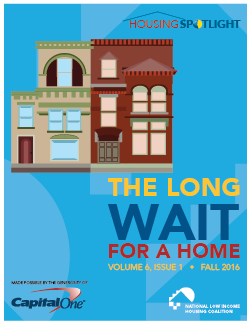Closed Waiting Lists and Long Waits Await those Seeking Affordable Housing, According to New NLIHC Survey
Oct 11, 2016
 WASHINGTON, D.C. - Today the National Low Income Housing Coalition (NLIHC) released Housing Spotlight: A Long Wait for a Home—a report that analyzes the current state of Housing Choice Vouchers and public housing waiting lists across the country. The report paints a bleak picture of an all-too-familiar situation facing families struggling with housing affordability—closed waiting lists and long waits for assistance.
WASHINGTON, D.C. - Today the National Low Income Housing Coalition (NLIHC) released Housing Spotlight: A Long Wait for a Home—a report that analyzes the current state of Housing Choice Vouchers and public housing waiting lists across the country. The report paints a bleak picture of an all-too-familiar situation facing families struggling with housing affordability—closed waiting lists and long waits for assistance.
Housing Choice Vouchers (HCV) help more than 2.2 million of the lowest income families live in stable, affordable homes by covering the difference between what they can afford to pay and the cost of modest rental homes in the private market. Very few eligible families receive this needed assistance due to limited funding. In Housing Spotlight: A Long Wait for a Home, NLIHC finds that 53% of HCV waiting lists were closed to new applicants and another 4% were open only to specific populations, such as homeless individuals and families, veterans, persons with a disability, or local residents. Sixty-five percent of closed HCV waiting lists had been closed for at least one year, more than half of public housing authorities (PHAs), which administer the HCV program and public housing, did not think their lists would reopen within the next year, and wait times for HCVs often spanned years.
NLIHC’s analysis shows that HCV waiting lists had a median wait time of 1.5 years for housing assistance. Twenty-five percent had a wait of at least 3 years. Twenty-five percent of the largest PHAs (5,000+ vouchers and public housing units combined) with HCV waiting lists had a wait time of at least 7 years. The average HCV waiting list consisted of 2,013 households.
Public Housing provides homes for approximately 1.1 million households. Wait lists for public housing had a median wait time of 9 months. Twenty-five percent of them had a wait time of at least 1.5 years. Public Housing waiting lists had an average size of 834 households.
HCVs and Public Housing serve our nation’s lowest income renters. Extremely low income (ELI) households, whose incomes are at or below 30% of the area median income, accounted for 74% of households on the average HCV waiting list and 67% of households on the average public housing waiting list.
“Most of the poor families that are unable to obtain affordable homes spend more than half of their limited incomes on housing. They face impossible choices between paying the rent or paying for food, medicine, transportation, or child care.” said NLIHC President and CEO Diane Yentel. “Congress can make more housing affordable to the lowest income people by significantly increasing investments in deeply targeted and highly effective tools like Housing Choice Vouchers, Public Housing and the national Housing Trust Fund.”
Currently, there are several bills in Congress that would expand funding for critical affordable housing programs. These bills include the “Pathways out of Poverty Act” (H.R. 2721) and the “Common Sense Housing Investment Act” (H.R. 1662), which propose modest changes to the mortgage interest deduction to provide additional funds for both vouchers and public housing, as well as the national Housing Trust Fund; the “Ending Homelessness Act of 2016” (H.R. 4888) which would increase funding for vouchers; and the “Affordable Housing Credit Improvement Act” (S. 3237), which would better target the Low Income Housing Tax Credit program to ELI renters.
“Home is the foundation for success in every aspect of our lives. Investing in homes is an investment in education, healthcare and economic mobility,” said Ms. Yentel. “As a nation, we understand the housing affordability crisis we face, we have the solutions, and we know how these solutions benefit families, communities and the economy. We lack only the political will to rebalance housing policy and target resources towards those with the greatest need. When we achieve that, we will end the long wait for a home for the nation’s lowest income families."
Housing Spotlight: The Long Wait for a Home is available at: http://bit.ly/2dGp2CU
Established in 1974 by Cushing N. Dolbeare, the National Low income Housing Coalition is dedicated solely to achieving socially just public policy that assures people with the lowest income in the United States have affordable and decent homes.